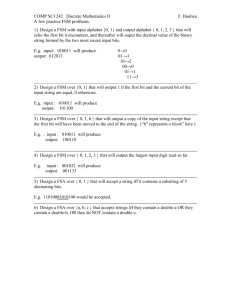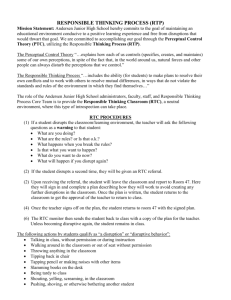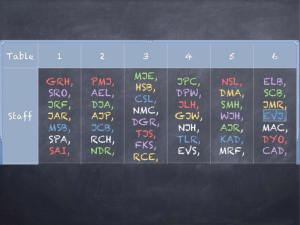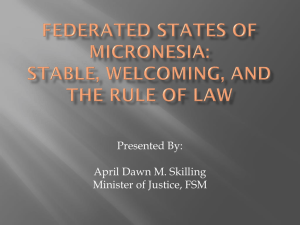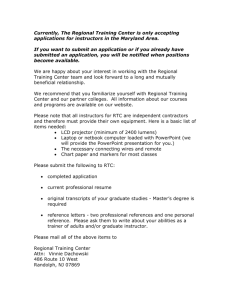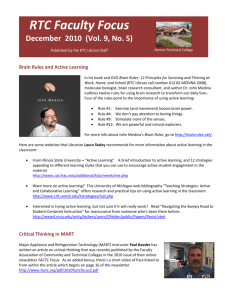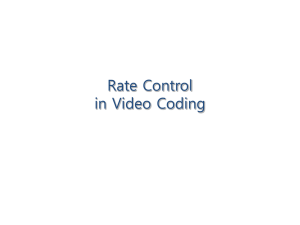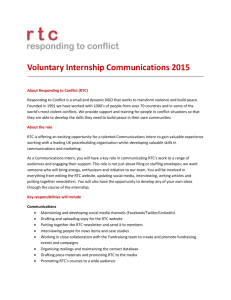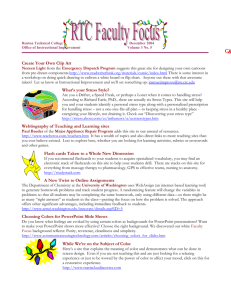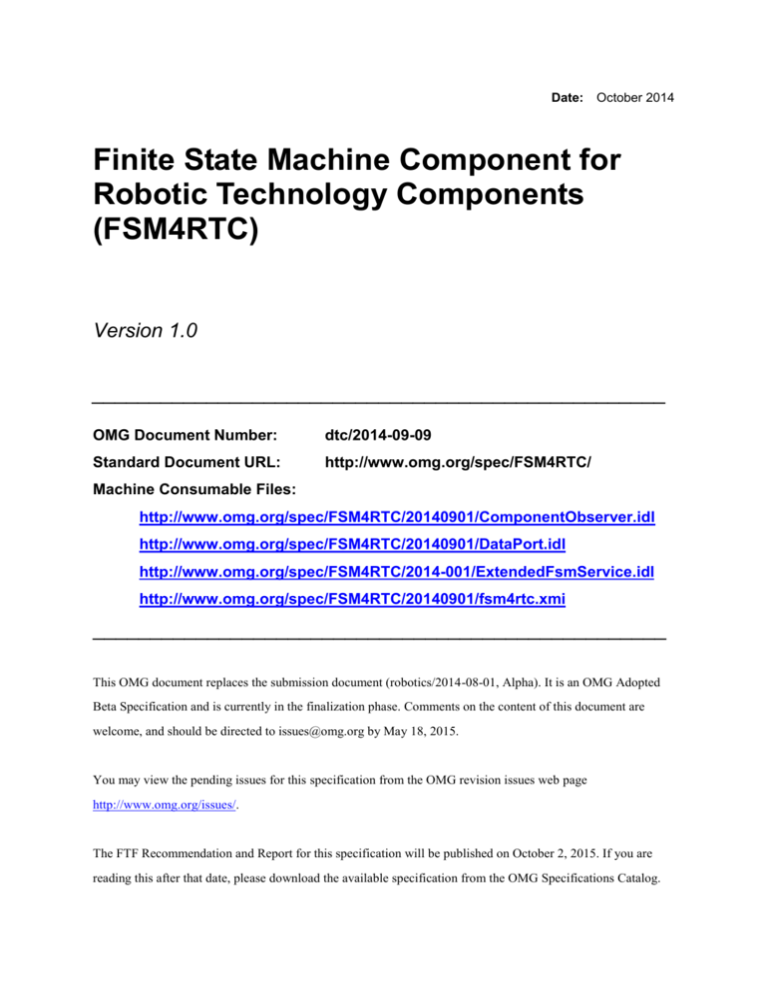
Date:
October 2014
Finite State Machine Component for
Robotic Technology Components
(FSM4RTC)
Version 1.0
__________________________________________________
OMG Document Number:
dtc/2014-09-09
Standard Document URL:
http://www.omg.org/spec/FSM4RTC/
Machine Consumable Files:
http://www.omg.org/spec/FSM4RTC/20140901/ComponentObserver.idl
http://www.omg.org/spec/FSM4RTC/20140901/DataPort.idl
http://www.omg.org/spec/FSM4RTC/2014-001/ExtendedFsmService.idl
http://www.omg.org/spec/FSM4RTC/20140901/fsm4rtc.xmi
__________________________________________________
This OMG document replaces the submission document (robotics/2014-08-01, Alpha). It is an OMG Adopted
Beta Specification and is currently in the finalization phase. Comments on the content of this document are
welcome, and should be directed to issues@omg.org by May 18, 2015.
You may view the pending issues for this specification from the OMG revision issues web page
http://www.omg.org/issues/.
The FTF Recommendation and Report for this specification will be published on October 2, 2015. If you are
reading this after that date, please download the available specification from the OMG Specifications Catalog.
Copyright © 2014, Honda R&D Co., Ltd.
Copyright © 2014, Object Management Group, Inc.
USE OF SPECIFICATION - TERMS, CONDITIONS & NOTICES
The material in this document details an Object Management Group specification in accordance with the terms,
conditions and notices set forth below. This document does not represent a commitment to implement any
portion of this specification in any company's products. The information contained in this document is subject to
change without notice.
LICENSES
The companies listed above have granted to the Object Management Group, Inc. (OMG) a nonexclusive,
royalty-free, paid up, worldwide license to copy and distribute this document and to modify this document and
distribute copies of the modified version. Each of the copyright holders listed above has agreed that no person
shall be deemed to have infringed the copyright in the included material of any such copyright holder by reason
of having used the specification set forth herein or having conformed any computer software to the
specification.
Subject to all of the terms and conditions below, the owners of the copyright in this specification hereby grant
you a fully-paid up, non-exclusive, nontransferable, perpetual, worldwide license (without the right to
sublicense), to use this specification to create and distribute software and special purpose specifications that are
based upon this specification, and to use, copy, and distribute this specification as provided under the Copyright
Act; provided that: (1) both the copyright notice identified above and this permission notice appear on any
copies of this specification; (2) the use of the specifications is for informational purposes and will not be copied
or posted on any network computer or broadcast in any media and will not be otherwise resold or transferred for
commercial purposes; and (3) no modifications are made to this specification. This limited permission
automatically terminates without notice if you breach any of these terms or conditions. Upon termination, you
will destroy immediately any copies of the specifications in your possession or control.
PATENTS
The attention of adopters is directed to the possibility that compliance with or adoption of OMG specifications
may require use of an invention covered by patent rights. OMG shall not be responsible for identifying patents
for which a license may be required by any OMG specification, or for conducting legal inquiries into the legal
validity or scope of those patents that are brought to its attention. OMG specifications are prospective and
advisory only. Prospective users are responsible for protecting themselves against liability for infringement of
patents.
GENERAL USE RESTRICTIONS
Any unauthorized use of this specification may violate copyright laws, trademark laws, and communications
regulations and statutes. This document contains information which is protected by copyright. All Rights
Reserved. No part of this work covered by copyright herein may be reproduced or used in any form or by any
means--graphic, electronic, or mechanical, including photocopying, recording, taping, or information storage
and retrieval systems--without permission of the copyright owner.
DISCLAIMER OF WARRANTY
WHILE THIS PUBLICATION IS BELIEVED TO BE ACCURATE, IT IS PROVIDED "AS IS" AND MAY
CONTAIN ERRORS OR MISPRINTS. THE OBJECT MANAGEMENT GROUP AND THE COMPANIES
LISTED ABOVE MAKE NO WARRANTY OF ANY KIND, EXPRESS OR IMPLIED, WITH REGARD TO
THIS PUBLICATION, INCLUDING BUT NOT LIMITED TO ANY WARRANTY OF TITLE OR
OWNERSHIP, IMPLIED WARRANTY OF MERCHANTABILITY OR WARRANTY OF FITNESS FOR A
PARTICULAR PURPOSE OR USE. IN NO EVENT SHALL THE OBJECT MANAGEMENT GROUP OR
ANY OF THE COMPANIES LISTED ABOVE BE LIABLE FOR ERRORS CONTAINED HEREIN OR FOR
DIRECT, INDIRECT, INCIDENTAL, SPECIAL, CONSEQUENTIAL, RELIANCE OR COVER DAMAGES,
INCLUDING LOSS OF PROFITS, REVENUE, DATA OR USE, INCURRED BY ANY USER OR ANY
THIRD PARTY IN CONNECTION WITH THE FURNISHING, PERFORMANCE, OR USE OF THIS
MATERIAL, EVEN IF ADVISED OF THE POSSIBILITY OF SUCH DAMAGES.
The entire risk as to the quality and performance of software developed using this specification is borne by you.
This disclaimer of warranty constitutes an essential part of the license granted to you to use this specification.
RESTRICTED RIGHTS LEGEND
Use, duplication or disclosure by the U.S. Government is subject to the restrictions set forth in subparagraph
(c) (1) (ii) of The Rights in Technical Data and Computer Software Clause at DFARS 252.227-7013 or in
subparagraph (c)(1) and (2) of the Commercial Computer Software - Restricted Rights clauses at 48 C.F.R.
52.227-19 or as specified in 48 C.F.R. 227-7202-2 of the DoD F.A.R. Supplement and its successors, or as
specified in 48 C.F.R. 12.212 of the Federal Acquisition Regulations and its successors, as applicable. The
specification copyright owners are as indicated above and may be contacted through the Object Management
Group, 140 Kendrick Street, Needham, MA 02494, U.S.A.
TRADEMARKS
MDA®, Model Driven Architecture®, UML®, UML Cube logo®, OMG Logo®, CORBA® and XMI® are
registered trademarks of the Object Management Group, Inc., and Object Management Group™, OMG™ ,
Unified Modeling Language™, Model Driven Architecture Logo™, Model Driven Architecture Diagram™,
CORBA logos™, XMI Logo™, CWM™, CWM Logo™, IIOP™ , IMM™ , MOF™ , OMG Interface
Definition Language (IDL)™ , and OMG SysML™ are trademarks of the Object Management Group. All other
products or company names mentioned are used for identification purposes only, and may be trademarks of their
respective owners.
COMPLIANCE
The copyright holders listed above acknowledge that the Object Management Group (acting itself or through its
designees) is and shall at all times be the sole entity that may authorize developers, suppliers and sellers of
computer software to use certification marks, trademarks or other special designations to indicate compliance
with these materials.
Software developed under the terms of this license may claim compliance or conformance with this
specification if and only if the software compliance is of a nature fully matching the applicable compliance
points as stated in the specification. Software developed only partially matching the applicable compliance
points may claim only that the software was based on this specification, but may not claim compliance or
conformance with this specification. In the event that testing suites are implemented or approved by Object
Management Group, Inc., software developed using this specification may claim compliance or conformance
with the specification only if the software satisfactorily completes the testing suites.
OMG’s Issue Reporting Procedure
All OMG specifications are subject to continuous review and improvement. As part of this process we
encourage readers to report any ambiguities, inconsistencies, or inaccuracies they may find by completing the
Issue Reporting Form listed on the main web page http://www.omg.org, under Documents, Report a Bug/Issue
(http://www.omg.org/technology/agreement.)
Table of Contents
1
2
Scope ........................................................................................................................................ 1
Conformance ............................................................................................................................ 1
2.1
Changes to RTC Specification .......................................................................................................... 1
2.2
Conformance points .......................................................................................................................... 1
3
Normative References .............................................................................................................. 1
4
Terms and Definitions .............................................................................................................. 1
5
Symbols .................................................................................................................................... 2
6
Additional Information ............................................................................................................. 2
6.1
Acknowledgements ........................................................................................................................... 2
7
Finite State Machine Component for Robotic Technology Components (FSM4RTC) ............ 3
7.1
General .............................................................................................................................................. 3
7.2
Platform Independent Model (PIM) .................................................................................................. 5
7.2.1
Overview ..................................................................................................................... 5
7.2.2
Format and Conventions ................................................................................................... 6
7.2.3
Basic Types ..................................................................................................................... 7
7.2.4
ComponentObserver ......................................................................................................... 8
7.2.5
ExtendedFsmService ...................................................................................................... 12
7.2.6
Data Port
................................................................................................................... 16
7.3
OMG IDL Platform Specific Model (PSM) .................................................................................... 28
7.3.1
Overview ................................................................................................................... 28
7.3.2
Basic Types ................................................................................................................... 28
7.3.3
RTC module ................................................................................................................... 29
7.3.4
Data Types ................................................................................................................... 29
7.3.5
ComponentObserver ....................................................................................................... 30
7.3.6
ExtendedFsmService ...................................................................................................... 30
7.3.7
Data Port
................................................................................................................... 31
Annex A: OMG IDL.......................................................................................................................................... 32
A.1
ComponentObserver.idl .................................................................................................................. 32
A.2
ExtendedFsmService.idl .................................................................................................................. 33
A.3
DataPort.idl ..................................................................................................................................... 34
Annex B: References ......................................................................................................................................... 35
Finite State Machine Component for Robotic Technology Components (FSM4RTC) , 1
i
Preface
OMG
Founded in 1989, the Object Management Group, Inc. (OMG) is an open membership, not-for-profit computer industry
standards consortium that produces and maintains computer industry specifications for interoperable, portable, and
reusable enterprise applications in distributed, heterogeneous environments. Membership includes Information
Technology vendors, end users, government agencies, and academia.
OMG member companies write, adopt, and maintain its specifications following a mature, open process. OMG’s
specifications implement the Model Driven Architecture® (MDA®), maximizing ROI through a full-lifecycle approach
to enterprise integration that covers multiple operating systems, programming languages, middleware and networking
infrastructures, and software development environments. OMG’s specifications include: UML® (Unified Modeling
Language™); CORBA® (Common Object Request Broker Architecture); CWM™ (Common Warehouse Metamodel);
and industry-specific standards for dozens of vertical markets.
More information on the OMG is available at http://www.omg.org/.
OMG Specifications
As noted, OMG specifications address middleware, modeling and vertical domain frameworks. All OMG Specifications
are available from the OMG website at:
http://www.omg.org/spec
Specifications are organized by the following categories:
Business Modeling Specifications
Middleware Specifications
• CORBA/IIOP
• Data Distribution Services
• Specialized CORBA
ii
Finite State Machine Component for Robotic Technology Components (FSM4RTC) , 1
IDL/Language Mapping Specifications
Modeling and Metadata Specifications
• UML, MOF, CWM, XMI
• UML Profile
Modernization Specifications
Platform Independent Model (PIM), Platform Specific Model (PSM), Interface Specifications
• CORBAServices
• CORBAFacilities
OMG Domain Specifications
CORBA Embedded Intelligence Specifications
CORBA Security Specifications
All of OMG’s formal specifications may be downloaded without charge from our website. (Products implementing OMG
specifications are available from individual suppliers.) Copies of specifications, available in PostScript and PDF format,
may be obtained from the Specifications Catalog cited above or by contacting the Object Management Group, Inc. at:
OMG Headquarters
140 Kendrick Street
Building A, Suite 300
Needham, MA 02494
USA
Tel: +1-781-444-0404
Fax: +1-781-444-0320
Email: pubs@omg.org
Certain OMG specifications are also available as ISO standards. Please consult http://www.iso.org
Typographical Conventions
The type styles shown below are used in this document to distinguish programming statements from ordinary English.
However, these conventions are not used in tables or section headings where no distinction is necessary.
Times/Times New Roman - 10 pt.:
Standard body text
Helvetica/Arial - 10 pt. Bold: OMG Interface Definition Language (OMG IDL) and syntax elements.
Courier - 10 pt. Bold:
Programming language elements.
Helvetica/Arial - 10 pt: Exceptions
NOTE: Terms that appear in italics are defined in the glossary. Italic text also represents the name of a document,
specification, or other publication.
Finite State Machine Component for Robotic Technology Components (FSM4RTC) , 1
iii
Issues
The reader is encouraged to report any technical or editing issues/problems with this specification to
http://www.omg.org/report_issue.htm.
iv
Finite State Machine Component for Robotic Technology Components (FSM4RTC) , 1
1
Scope
This specification defines the following items by extending the RTC specifications:
1.
service interface which provides FSM component meta data including an FSM structure together with
appropriate data models;
2.
service interface which provides the current state of the FSM component;
3.
service interface which notifies internal actions of the FSM component including state transitions;
4.
extended RTC::PortService which receives structured event data from outside; and
5.
data model to describe structured event data including events with parameters
2
Conformance
2.1
Changes to RTC Specification
This specification does not modify the adopted RTC specification. It reuses and/or adds functionality on top of the
current RTC specification.
2.2
Conformance points
This specification defines the following conformance points:
1.
Component Observer (see Section 7.2.4)
2.
Extended FSM Service (see Section 7.2.5)
3.
Data Port Profiles (see Section 7.2.6)
Conformance with the “FSM4RTC” specification requires conformance with all the mandatory conformance points.
3
Normative References
The following normative documents contain provisions which, through reference in this text, constitute provisions of this
specification. For dated references, subsequent amendments to, or revisions of, any of these publications do not apply.
[UML] Object Management Group, OMG Unified Modeling Language (OMG UML), Superstructure, Version 2.5,
http://www.omg.org/spec/UML/2.5/Beta1/
[RTC] Robotic Technology Component specification, http://www.omg.org/spec/RTC/1.1/
[SDO] Super distributed Object Specification, http://www.omg.org/spec/SDO/1.1/
4
Terms and Definitions
Finite State Machine Component for Robotic Technology Components (FSM4RTC) , 1
1
For the purposes of this specification, the following terms and definitions apply.
Robotic Technology Component (RTC)
A logical representation of a hardware and/or software entity that provides well-known functionality and services
Super Distributed Object (SDO)
A logical representation of a hardware device or a software component that provides well-known functionality and
services.
Extensible Markup Language (XML)
A markup language that defines a set of rules for encoding documents in a format that is both human-readable and
machine-readable.
XML Metadata Interchange (XMI)
An OMG standard for exchanging metadata information via XML.
State Chart XML (SCXML)
An XML-based markup language which provides a generic state-machine based execution environment based on UML
Statecharts.
5
Symbols
There are no special symbols or terms.
6
Additional Information
6.1
Acknowledgements
The following company submitted this specification:
Honda R&D Co., Ltd.
Fundamental Technology Research Center
8-1 Honcho, Wako-shi, Saitama, 351-0188 Japan
Contact: Makoto Sekiya (makoto_sekiya@n.f.rd.honda.co.jp)
The following company supported this specification:
National Institute of Advanced Industrial Science and Technology
2
Finite State Machine Component for Robotic Technology Components (FSM4RTC), 1
7
7.1
Finite State Machine Component for Robotic
Technology Components (FSM4RTC)
General
According to the RTC specification, an FSM component can be defined as Figure 7.1. However, access methods and
interfaces to ensure interoperability of the FSM component are not defined in the specification.
Thus, tools and other RTCs are not able to get notifications, the current state and the structure from the FSM component
in an interoperable way. In addition to that, the definition of ports in the RTC specification is not sufficient to provide
RTCs with the standard data communication method.
Figure 7.2 shows a use case as a solution. ComponentObserver gets notifications from the FSM components.
ExtendedFsmService is an interface for setting/getting the current state and an FSM structure data model which
contains states and transition rules of the FSM. Using DataPort, other RTCs can send events with data to the FSM
components.
This specification uses SDOService and key/values properties of PortProfile and ConnectorProfile to extend the
RTC specification so that components conform to the RTC specification can communicate both existing RTCs and
extended RTCs.
The PIM for the above interface is specified in Section 7.2 and the PSM is specified in Section 7.3.
pkg
<<interface>>
RTC::LightweightRTObject
<<interface>>
SDOPackage::SDOSystemElement
<<interface>>
SDOPackage::SDO
<<interface>>
RTC::Fsm
<<interface>>
RTC::RTObject
FsmComponent
Figure 7.1 – An example declaration of FSM component (non-normative)
Finite State Machine Component for Robotic Technology Components (FSM4RTC) , 1
3
uc
ComponentObserver
Notify State Changed
Notify Fsm Structure Changed
ExtendedFsmService
Set Fsm Structure
Tools
FsmComponent
Get Fsm Structure
Get Current State
Other RTCs
DataPort
Send Events
Figure 7.2 – Proposed use case of FSM component (non-normative)
4
Finite State Machine Component for Robotic Technology Components (FSM4RTC), 1
7.2
Platform Independent Model (PIM)
7.2.1
Overview
This section specifies the PIM for service interfaces and data models. At first, in Section 7.2.3, basic types are
introduced. Section 7.2.4, “ComponentObserver” describes the PIM for the interface and data model, which are used
to receive notifications from RTCs. Section 7.2.5, “ExtendedFsmService” defines the interfaces and data models to
access and manipulate the structure of the FSM. Section 7.2.6, “Data Port” introduces DataPushService and
DataPullService interfaces realize push/pull types of data communication models and properties specify the detail
parameters for data communication. Figure 7.3 shows an overview UML notation of the PIM.
pkg
<<interface>>
LightweightRTObject
<<interface>>
PortService
*
1
<<interface>>
SDO
<<interface>>
RTObject
1
1
<<interface>>
Configuration
1
1
1
*
PortProfile
ServiceProfile
- name : String
- interfaces : PortInterfaceProfile[]
- port_ref : PortService
- connector_profiles : ConnectorProfile[]
- owner : RTObject
- properties : NameValue[]
- id : String
- interface_type : String
- properties : NameValue[]
- service : SDOService
1
*
1
ConnectorProfile
- name : String
- connector_id : String
- ports : PortService[]
- properties : NameValue[]
<<interface>>
DataPushService
1
<<interface>>
DataPullService
<<interface>>
SDOService
<<interface>>
ComponentObserver
Finite State Machine Component for Robotic Technology Components (FSM4RTC) , 1
5
<<interface>>
ExtendedFsmService
pkg
RTC
SDOPackage
<<interface>>
RTC::LightweightRTObject
<<interface>>
RTC::PortService
<<interface>>
SDOPackage::SDO
<<interface>>
RTC::RTObject
<<interface>>
SDOPackage::Configuration
SDOPackage::ServiceProfile
RTC::PortProfile
- name : String
- interfaces : PortInterfaceProfile[]
- port_ref : PortService
- connector_profiles : ConnectorProfile[]
- owner : RTObject
- properties : NameValue[]
- id : String
- interface_type : String
- properties : NameValue[]
- service : SDOService
<<interface>>
SDOPackage::SDOService
RTC::ConnectorProfile
- name : String
- connector_id : String
- ports : PortService[]
- properties : NameValue[]
FSM4RTC
<<interface>>
RTC::DataPushService
<<interface>>
RTC::DataPullService
<<interface>>
RTC::ComponentObserver
<<interface>>
RTC::ExtendedFsmService
Figure 7.3 – Overview of FSM4RTC PIM
7.2.2
Format and Conventions
This specification uses UML diagrams [UML] to show classes and their relationships. All classes are part of the RTC
package extended by FSM4RTC (Finite State Machine Component for RTC) specification. If, in a UML diagram, a
class's attribute and operation compartments are suppressed, then this class is elaborated elsewhere. In this case, the
diagram might also not show all of the class' associations. However, if a class is shown to have only an attribute or an
operation compartment, then this signifies that the not-shown compartment is empty. I.e., if a class is shown with an
attribute but no operation compartment, then the class does not have any operations.
6
Finite State Machine Component for Robotic Technology Components (FSM4RTC), 1
7.2.3
Basic Types
This specification reuses the types from [UML], [SDO], [RTC]. These reused types are described in this section.
7.2.3.1
String [UML]
Description
The String primitive type represents a character string that can be used for any character set.
String is an instance of PrimitiveType [UML].
7.2.3.2
Octet [RTC]
Description
The Octet primitive type, a specialization of Integer primitive type, is an unsigned integer within range [0, 255].
Octet is an instance of PrimitiveType [UML].
7.2.3.3
ReturnCode_t [RTC]
<<enumeration>>
ReturnCode_t
- OK
- ERROR
- BAD_PARAMETER
- UNSUPPORTED
- OUT_OF_RESORCES
- PRECONDITION_NOT_MET
Figure 7.4 – ReturnCode_t
Description
A number of operations in this specification will need to report potential error conditions to their clients. This task shall
be accomplished by means of operation “return codes” of type ReturnCode_t.
Operations in the PIM that do not return a value of type ReturnCode_t shall report errors in the following ways,
depending on their return type:
•
If an operation normally returns a positive numerical value (such as get_rate, see Section 5.2.2.6.4 of
[RTC]), it shall indicate failure by returning a negative value.
•
If an operation normally returns an object reference (such as RTObject::get_component_profile, see
Section 5.4.2.2.1 of [RTC]), it shall indicate failure by returning a nil reference.
Finite State Machine Component for Robotic Technology Components (FSM4RTC) , 1
7
Attributes
OK
ERROR
BAD_PARAMETER
UNSUPPORTED
OUT_OF_RESORCES
PRECONDITION_NOT_MET
Enumeration to specify the operation completed successfully
Enumeration to specify that the operation failed with a generic,
unspecified error
Enumeration to specify that the operation failed because an illegal
argument was passed to it
Enumeration to specify that the operation is unsupported by the
implementation (e.g., it belongs to a compliance point that is not
implemented)
Enumeration to specify that the target of the operation ran out of the
resources needed to complete the operation
Enumeration to specify that a pre-condition for the operation was not
met
Associations
No additional associations.
7.2.3.4
NameValue [SDO]
NameValue
- name : String
- value : any
Figure 7.5 – NameValue
Description
NameValue is a pair of a name and its value defined in the Section 7.3.2 of [SDO].
Attributes
name: String
value: any
A name of a value
The value of the name
Associations
No additional associations.
7.2.4
ComponentObserver
This section specifies ComponentObserver. As Figure 7.6 shows, ComponentObserver is an SDO service which
notifies status update of a RTC to other tools or RTCs. Kinds of updated status are defined as RTC::StatusKind.
8
Finite State Machine Component for Robotic Technology Components (FSM4RTC), 1
pkg
<<interface>>
SDOPackage::SDOService
<<interface>>
RTC::ComponentObserver
+ update_status(status_kind : StatusKind, hint : String) : void
<<enumeration>>
RTC::StatusKind
- COMPONENT_PROFILE
- RTC_STATUS
- EC_STATUS
- PORT_PROFILE
- CONFIGURATION
- RTC_HEARTBEAT
- EC_HEARTBEAT
- FSM_PROFILE
- FSM_STATUS
- FSM_STRUCTURE
- USER_DEFINED
- STATUS_KIND_NUM
Figure 7.6 – Overview of ComponentObserver PIM
7.2.4.1
StatusKind
<<enumeration>>
RTC::StatusKind
- COMPONENT_PROFILE
- RTC_STATUS
- EC_STATUS
- PORT_PROFILE
- CONFIGURATION
- RTC_HEARTBEAT
- EC_HEARTBEAT
- FSM_PROFILE
- FSM_STATUS
- FSM_STRUCTURE
- USER_DEFINED
- STATUS_KIND_NUM
Figure 7.7 – StatusKind
Description
StatusKind is an enumeration type to classify updated status in target RTC.
Attributes
COMPONENT_PROFILE
RTC_STATUS
Enumeration to specify that the target component's
RTC::ComponentProfile has been changed
Enumeration to specify that the target component's status has been
Finite State Machine Component for Robotic Technology Components (FSM4RTC) , 1
9
EC_STATUS
PORT_PROFILE
CONFIGURATION
RTC_HEARTBEAT
EC_HEARTBEAT
FSM_PROFILE
FSM_STATUS
FSM_STRUCTURE
USER_DEFINED
STATUS_KIND_NUM
changed
Enumeration to specify that the target component's status of execution
contexts has been changed
Enumeration to specify that the target component's status of ports has
been changed
Enumeration to specify that the target component's configuration has
been changed
Enumeration to notify that the target component is alive
Enumeration to notify that the target execution context is alive
Enumeration to specify that the target component's FSM profile has
been changed
Enumeration to specify that the target component's FSM status has
been changed
Enumeration to specify that the target component's FSM structure has
been changed
Enumeration to specify a user defined notification
Enumeration to specify the number of attributes
Associations
No additional associations.
7.2.4.2
ComponentObserver interface
<<interface>>
RTC::ComponentObserver
+ update_status(status_kind : StatusKind, hint : String) : void
Figure 7.8 – ComponentObserver
Description
ComponentObserver is an interface to notify various status changed in RTC to others. This is attached into a target
RTC/SDO as an SDO service, and if an RTC/SDO's status changes, a kind of changed status and its hints are notified to
observers. A non-normative assumed usage is shown as Figure 7.9.
Operations
This operation notifies a status update. The status_kind
update_status(in StatusKind status_kind, in String hint): void indicates the kind of updated status, and the hint give some
hint about updated status.
Hints
The following hints are defined in this specification to realize interoperability of information from
ComponentObserver.
COMPONENT_PROFILE
RTC_STATUS
EC_STATUS
The name of changed profile’s key
INACTIVE:Execution Context ID (ex. INACTIVE:1002)
ACTIVE:Execution Context ID
ERROR:Execution Context ID
ATTACHED:Execution Context ID
10
Finite State Machine Component for Robotic Technology Components (FSM4RTC), 1
PORT_PROFILE
CONFIGURATION
FSM_STATUS
FSM_STRUCTURE
USER_DEFINED
DETACHED:Execution Context ID
RATE_CHANGED:Execution Context ID
STARTUP:Execution Context ID
SHUTDOWN:Execution Context ID
ADD:port name (ex. ADD:velocity)
REMOVE:port name
CONNECT:port name
DISCONNECT:port name
UPDATE_CONFIGSET:configuration set's name
(ex. UPDATE_CONFIGSET:default)
UPDATE_PARAMETER:<config set's name>.<config param's key>
(ex. UPDATE_ PARAMETER:default.key)
SET_CONFIG_SET:config set's name
ADD_CONFIG_SET:config set's name
REMOVE_CONFIG_SET:config set's name
ACTIVATE_CONFIG_SET:config set's name
Name of the current state
Name of the FSM
User defined text
Attributes
No additional attributes.
Associations
No additional associations.
Finite State Machine Component for Robotic Technology Components (FSM4RTC) , 1
11
sd ComponentObserver
RTObject
Configuration
ComponentObserver
Tool
1: get_configuration()
2: add_service_profile(prof)
3: update_status(kind, hint)
4: update_status(kind, hint)
5: remove_service_profile(id)
Figure 7.9 – Sequence for adding ComponentObserver (non-normative)
7.2.5
ExtendedFsmService
This section specifies ExtendedFsmService. As Figure 7.10 shows, ExtendedFsmService is an SDO service.
With ExtendedFsmService, a RTC can provide extended interfaces to get the current status of the FSM and set/get
the structure definition data model of the FSM for other tools and RTCs.
pkg
FsmEventProfile
<<interface>>
SDOPackage::SDOService
- name : String
- data_type : String
*
1
RTC::FsmStructure
<<interface>>
RTC::ExtendedFsmService
+ get_current_state() : String
+ set_fsm_structure( in fsm_structure : FsmStructure) : ReturnCode_t
+ get_fsm_structure(inout fsm_structure : FsmStructure) : ReturnCode_t
1
1
Figure 7.10 – Overview of ExtendedFsmService PIM
12
Finite State Machine Component for Robotic Technology Components (FSM4RTC), 1
- name : String
- structure : String
- event_profiles : FsmEventProfile[]
- properties : NameValue[]
7.2.5.1
FsmEventProfile
FsmEventProfile
- name : String
- data_type : String
Figure 7.11 – FsmEventProfile
Description
FsmEventProfile is a data model to bind the name of event and its data type of the FSM component.
Attributes
name: String
data_type: String
A name of the FSM.
The type of the event data as
CORBA::RepositoryID.
Associations
No additional associations.
7.2.5.2
FsmStructure
RTC::FsmStructure
- name : String
- structure : String
- event_profiles : FsmEventProfile[]
- properties : NameValue[]
Figure 7.12 – FsmStructure
Description
FsmStructure is a data model to describe a structure of an FSM of the FSM component. FsmStructure is used to
specify the name and description format of an FSM. Detail usage is explained in Section 7.2.5.3, “ExtendedFsmService
interface”.
Attributes
name: String
structure: String
event_profiles: FsmEventProfile[]
properties: NameValue
A name of the FSM.
A string formatted description of the structure of the FSM.
An array of FsmEventProfile.
Additional properties of the FsmStructure.
Properties
Names of properties of FsmStructure have the dot-separated prefix “fsm_structure”.
Finite State Machine Component for Robotic Technology Components (FSM4RTC) , 1
13
The format of the structure attribute
Description format property of the
structure of the FSM
name
value
fsm_structure.format
The specified format name of structure (ex. scxml, xmi).
Associations
No additional associations.
7.2.5.3
ExtendedFsmService interface
<<interface>>
RTC::ExtendedFsmService
+ get_current_state() : String
+ set_fsm_structure( in fsm_structure : FsmStructure) : ReturnCode_t
+ get_fsm_structure(inout fsm_structure : FsmStructure) : ReturnCode_t
Figure 7.13 – ExtendedFsmService
sd ExtendedFsmService
RTObject
Tool
Configuration
<<create>>
1: create()
ExtendedFsmService
2: get_configuration()
3: add_service_profile(prof)
4: get_service_profiles()
5: get_fsm_structure(fsm)
6: set_fsm_structure(fsm)
Figure 7.14 – Sequence for creating and using ExtendedFsmService (non-normative)
14
Finite State Machine Component for Robotic Technology Components (FSM4RTC), 1
Description
ExtendedFsmService is an interface to set and get the structure of an FSM in the FSM component from others. This
is created by a target RTC as a SDO service and added to its own configuration. A non-normative usage is shown as
Figure 7.14. Tools get the reference of an ExtendedFsmService via configuration of the target RTC. After getting the
ExtendedFsmService, tools can get and set the FsmStructure of the target RTC.
Operations
This operation returns the current state of an FSM in the
target FSM component.
This operation returns the structure of an FSM in the target
FSM component. ExtendedFsmService returns the name,
fsm_structure:FsmStructure):
structure with format specified by fsm_structure.format and
EventProfiles. RTCs may return UNSUPPORTED if this
operation is not implemented.
This operation sets an FsmStructure to the target
component. Then the target component reconfigures its FSM
fsm_structure:FsmStructure):
structure such as transition rules according to the values of
the given fsm_structure. RTCs may return
UNSUPPORTED if this operation is not implemented.
get_current_state(): String
get_fsm_structure(out
ReturnCode_t
set_fsm_structure(in
ReturnCode_t
Attributes
No additional attributes.
Associations
No additional associations.
Finite State Machine Component for Robotic Technology Components (FSM4RTC) , 1
15
7.2.6
Data Port
RTC specification provides the definition of PortService for RTCs as an interface to communicate each other. As
Figure 7.15 shows, however, PortService doesn’t provide the method to send and receive a certain data type between
RTCs. Thus, this specification adds the following data and service models for that purpose.
pkg
RTC::PortProfile
<<interface>>
RTC::PortService
+
+
+
+
+
+
+
+
*
get_port_profile() : PortProfile
get_connector_profiles() : ConnectorProfile[]
get_connector_profile(connector_id : String) : ConnectorProfile
connect(connector_profile : ConnectorProfile) : ReturnCode_t
disconnect(connector_id : String) : ReturnCode_t
notify_connect(connector_profile : ConnectorProfile) : ReturnCode_t
notify_disconnect(connector_id : String) : ReturnCode_t
disconnect_all() : ReturnCode_t
- name : String
- interfaces : PortInterfaceProfile[]
- port_ref : PortService
- connector_profiles : ConnectorProfile[]
- owner : RTObject
- properties : NameValue[]
1
RTC::ConnectorProfile
1
<<interface>>
RTC::DataPushService
<<interface>>
RTC::DataPullService
+ push(data : Octet[]) : PortStatus
+ pull(data : Octet[]) : PortStatus
*
- name : String
- connector_id : String
- ports : PortService[]
- properties : NameValue[]
<<enumration>>
RTC::PortStatus
- PORT_OK
- PORT_ERROR
- BUFFER_FULL
- BUFFER_EMPTY
- BUFFER_TIMEOUT
- UNKNOWN_ERROR
Figure 7.15 – Overview of DataPushService and DataPullService PIM
In the FSM4RTC PIM, two types of communication models are assumed. One is “Sender-push” model and the other is
“Receiver-pull” model (Figure 7.16). Figure 7.17 shows how interfaces and data models collaborate to realize these
communication models. As Figure 7.17, in the “Sender-push” model, an out port writes data to the buffer of a connector.
And then the data is pushed to the buffer of DataPushService. Finally an in port reads the data from
DataPushService. On the other hand, in the “Receiver-pull” model, when an in port calls “read”, the data
written by an out port to the buffer of DataPullService is pulled from a connector and returned to the in
port. “Receiver-pull” model is used to minimize the network communications between senders and
receivers by pulling the data when it’s required.
16
Finite State Machine Component for Robotic Technology Components (FSM4RTC), 1
Sender-push model
OutPort
InPort
OutPort
InPort
Receiver-pull model
Figure 7.16 – Communication model of data port (non-normative)
Sender-push model
Notify full/timeout
Notify empty/timeout
DataPushService
Out port
Write
Push
Read
Write buffer
Read buffer
Write buffer
properties
Read buffer
properties
PortProfile
ConnectorProfile
Write buffer
properties
In port
PortProfile
Read buffer
properties
DataPullService
Out port
Write
Pull
Write buffer
Notify full/timeout
Read
Read buffer
Notify empty/timeout
Receiver-pull model
Figure 7.17 – Concept model of data port (non-normative)
Finite State Machine Component for Robotic Technology Components (FSM4RTC) , 1
17
In port
7.2.6.1
PortStatus
<<enumration>>
RTC::PortStatus
- PORT_OK
- PORT_ERROR
- BUFFER_FULL
- BUFFER_EMPTY
- BUFFER_TIMEOUT
- UNKNOWN_ERROR
Figure 7.18 – PortStatus
Description
PortStatus is an enumeration type to classify result of operations of DataPushService and DataPullService.
Attributes
PORT_OK
PORT_ERROR
BUFFER_FULL
BUFFER_EMPTY
BUFFER_TIMEOUT
UNKNOWN_ERROR
Enumeration to specify that the result of an action of the data port has
been success.
Enumeration to specify that the result of an action of the data port has
been failed.
Enumeration to notify that the buffer of the data port is full.
Enumeration to notify that the buffer of the data port is empty.
Enumeration to notify that the write or read from buffer of the data port
is timeout.
Enumeration to specify that the result of an action of the data port has
been failed with unknown error.
Associations
No additional associations.
7.2.6.2
PortProfile [RTC]
RTC::PortProfile
- name : String
- interfaces : PortInterfaceProfile[]
- port_ref : PortService
- connector_profiles : ConnectorProfile[]
- owner : RTObject
- properties : NameValue[]
Figure 7.19 – PortProfile
Description
PortProfile is defined in [RTC] describe profiles of a port of an RTC. This specification extends PortProfile using the
properties attribute as follows. These properties are used to declare supported types of communications of the port.
18
Finite State Machine Component for Robotic Technology Components (FSM4RTC), 1
Properties
Properties of PortProfile are used to declare supported types of data ports provided by PortService. Names of
properties have the dot-separated prefix “dataport”. Each property may have comma-separated multiple values. This
section defines the minimum set of values of each property to realize interoperability among RTCs. Implementations
may support additional values for each property. For example, dataport.interface_type property of an implementation
which supports DDS interface includes “dds”.
Dataflow type property
Property to define supported data communication models
name
type
dataport.dataflow_type
string
value
description
push
If this value exists, sender-push model is supported.
pull
If this value exists, receiver-pull model is supported.
IO mode property
Property to define supported IO modes to write data
name
type
value
dataport.io_mode
string
block
nonblock
description
If this value exists, block mode is supported. In block mode, write method of
an out port is blocked until the data has been pushed to DataPushService.
If this value exists, nonblock mode is supported. In nonblock mode, write
method of an out port returns immediately.
Data type property
Property to define the data type used in data ports. PortService sets the same data type for all provided data ports
name
value
description
dataport.data_type
string
A data type as CORBA::RepositoryID.
Interface type property
Property to define the interface type(s) of a data port
name
value
description
dataport.interface_type
string
corba. If this value exists, CORBA interface is supported.
Marshaling type property
Property to define the supported marshaling type(s) of data
name
value
description
dataport.marshaling_type
string
If this value exists, CDR is supported.
Finite State Machine Component for Robotic Technology Components (FSM4RTC) , 1
19
Timestamp policy property
Property to define the supported timestamp policies
name
value
on_write
on_send
dataport.timestamp_policy
on_received
on_read
none
description
If this value exists, a timestamp can be set when an out port
writes a data.
If this value exists, a timestamp can be set before a data is
pushed to DataPushService or pulled from
DataPullService.
If this value exists, a timestamp can be set after a data is
pushed to DataPushService or pulled from
DataPullService.
If this value exists, a timestamp can be set when an in port
reads a data.
If this value exists, RTCs don’t set any timestamp.
Write buffer length property
Property to define the default length of the write buffer
name
value
description
dataport.write.buffer.length
string
A positive integer to define the length of the write buffer.
Write buffer full policy property
Property to define the supported policies when the write buffer is full.
name
value
overwrite
dataport.write.buffer.full_policy
do_nothing
block
description
If this value exists, overwrite policy is supported. As
overwrite policy, a data is over written when the write
buffer is full.
If this value exists, do_nothing policy is supported. As
do_nothing policy, a data is not written when the write
buffer is full.
If this value exists, block policy is supported. As block
policy, writing to the write buffer is blocked until the write
buffer is available.
Write buffer timeout property
Property to define default timeout for block policy of the write buffer
name
value
description
dataport.write.buffer.timeout
string
Timeout of blocking [s]
20
Finite State Machine Component for Robotic Technology Components (FSM4RTC), 1
Read buffer length property
Property to define the default length of the read buffer
name
value
description
dataport.read.buffer.length
string
A positive integer to define the length of the read buffer.
Read buffer empty policy property
Property to define the supported policies when the read buffer is empty
name
value
read_back
dataport.read.buffer.empty_policy
do_nothing
block
description
If this value exists, read_back policy is supported. As
read_back policy, the read method of an in port returns
the last data when the read buffer is empty.
If this value exists, do_nothing policy is supported. As
do_nothing policy, the read method of an in port returns
nothing when the read buffer is empty.
If this value exists, block policy is supported. As block
policy, the read method of an in port blocks until the read
buffer is available.
Read buffer timeout property
Property to define the default timeout for block policy of the read buffer
name
value
description
dataport.read.buffer.timeout
string
Timeout of blocking [s]
Read buffer queue policy property
Property to define the supported queue policies of the read buffer
name
value
all
dataport.read.buffer.queue_policy
fifo
new
description
If this value exists, all policy is supported. As all policy, all
queued data in the read buffer is read at once.
If this value exists, fifo policy is supported. As fifo policy,
queued data in the read buffer is read with FIFO order.
If this value exists, new policy is supported. As new policy,
the latest data in the read buffer is read.
Finite State Machine Component for Robotic Technology Components (FSM4RTC) , 1
21
7.2.6.3
ConnectorProfile [RTC]
RTC::ConnectorProfile
- name : String
- connector_id : String
- ports : PortService[]
- properties : NameValue[]
Figure 7.20 – ConnectorProfile
Description
ConnectorProfile is defined in [RTC] to contain information for connecting the ports of collaborating RTCs. This
specification extends ConnectorProfile using the properties attribute as follows. These properties are used to direct a
port to provide the interface with specified configuration. If the configuration is acceptable for the port, then an instance
of required interface is created and the PortService::connect operation shall return ReturnCode_t::OK. If the port
is unable to provide the interface the PortService::connect operation shall return
ReturnCode_t::BAD_PARAMETER (Figure 7.21). The acceptable configurations are defined as properties of
PortProfile (Section 7.2.6.2).
act connect ports
Tool
PortService
DataPushService
make a connection
profile : ConnectorProfile
connect
port_profile : PortProfile
check properties
[invalid properties] / return ReturnCode_t::BAD_PARAMETER
[valid properties]
create a data port
[failed] / return ReturnCode_t::ERROR
[success] / return ReturnCode_t::OK
Figure 7.21 – Workflow of connection operations (non-normative)
22
Finite State Machine Component for Robotic Technology Components (FSM4RTC), 1
Properties
Properties of ConnectorProfile are used to request PortService to provide a specific type of data port between RTCs.
Names of properties have the dot-separated prefix “dataport”. Each property must have a single value.
Dataflow type property
Property to specify the requested data communication model
name
dataport.dataflow_type
value
push
pull
description
IO mode property
Property to specify the requested IO mode to push or pull data
name
value
dataport.io_mode
block
nonblock
description
If this value exists, block mode is supported. In block mode, write
method of an out port is blocked until the data has been pushed to
DataPushService.
If this value exists, nonblock mode is supported. In nonblock
mode, write method of an out port returns immediately.
Interface type property
Property to specify the requested interface type of a data port
name
dataport.interface_type
value
string
description
corba
Marshaling type property
Property to specify the requested marshaling type of a data
name
dataport.marshaling_type
value
string
description
cdr
Timestamp policy property
Property to specify the requested timestamp policy
name
dataport.timestamp_policy
value
on_write
on_send
on_received
on_read
none
description
Finite State Machine Component for Robotic Technology Components (FSM4RTC) , 1
23
Write buffer length property
Property to specify the requested length of the write buffer
name
value
description
dataport.write.buffer.length
string
A positive integer to define the default length of the write buffer.
Write buffer full policy property
Property to specify the requested policy when the write buffer is full.
name
dataport.write.buffer.full_policy
value
overwrite
do_nothing
block
on_read
description
none
Write buffer timeout property
Property to specify default timeout for block policy of the write buffer
name
value
description
dataport.write.buffer.timeout
string
timeout of blocking [s]
Read buffer length property
Property to specify the default length of the read buffer
name
value
description
dataport.read.buffer.length
string
A positive integer to define the default length of the read buffer.
Read buffer empty policy property
Property to specify the supported policies when the read buffer is empty
name
dataport.read.buffer.empty_policy
value
read_back
do_nothing
block
description
Read buffer timeout property
Property to specify the default timeout for block policy of the read buffer
name
value
description
dataport.read.buffer.timeout
string
timeout of blocking [s]
24
Finite State Machine Component for Robotic Technology Components (FSM4RTC), 1
Read buffer queue policy property
Property to specify the supported queue policies of the read buffer
name
dataport.read.buffer.queue_policy
value
all
fifo
new
description
FSM event name property
Property to bind an event name and a data port
name
value
dataport.fsm_event_name
7.2.6.4
string
description
The name of the event bound with the data port as text
format.
DataPushService interface
<<interface>>
RTC::DataPushService
+ push(data : Octet[]) : PortStatus
Figure 7.22 – DataPushService
Description
DataPushService is an interface to push an array of Octet to the target port with a specified binary format such as
Common Data Representation (CDR) format. Figure 7.18 shows a non-normative example of a sequence diagram to
create and use DataPushService.
Finite State Machine Component for Robotic Technology Components (FSM4RTC) , 1
25
sd DataPushService
OutComp:
RTObject
OutPort:
PortService
InComp:
RTObject
InPort:
PortService
Tool
1: get_ports()
2: get_port_profile()
3: get_ports()
4: get_port_profile()
5: connect(prof)
5.1: notify_connect(prof)
5.1.1: notify_connect(prof)
<<create>>
6: create()
DataPushService
7: write()
7.1: push(data)
8: read()
Figure 7.23 – Sequence for creating and using DataPushService (non-normative)
Operations
push(in Octet[] data): PortStatus
This operation pushes an array of Octet to the he target port with a
specified binary format.
Attributes
No additional attributes.
Associations
No additional associations.
7.2.6.5
DataPullService interface
<<interface>>
RTC::DataPullService
+ pull(data : Octet[]) : PortStatus
Figure 7.24 – DataPullService
26
Finite State Machine Component for Robotic Technology Components (FSM4RTC), 1
Description
DataPullService is an interface to pull array of Octet from the target port with a specified binary format such as
Common Data Representation (CDR) format. Figure 7.20 shows a non-normative example of a sequence diagram to
create and use DataPullService.
sd DataPullService
InComp:
RTObject
InPort:
PortService
OutComp:
RTObject
OutPort:
PortService
Tool
1: get_ports()
2: get_port_profile()
3: get_ports()
4: get_port_profile()
5: connect(prof)
5.1: notify_connect(prof)
5.1.1: notify_connect(prof)
<<create>>
6: create()
DataPullService
7: write()
8: read()
8.1: pull(data)
Figure 7.25 – Sequence for creating and using DataPullService (non-normative)
Operations
pull(in Octet[] data): PortStatus
This operation pulls an array of Octet from the he target port with a
specified binary format.
Attributes
No additional attributes.
Associations
No additional associations.
Finite State Machine Component for Robotic Technology Components (FSM4RTC) , 1
27
7.3
OMG IDL Platform Specific Model (PSM)
The OMG IDL PSM is provided by means of the IDL that defines the interface an application can use to interact with the
Service.
7.3.1
Overview
This section introduces a CORBA specific model for the Finite State Machine Component for RTC (FSM4RTC)
Platform Independent Model (PIM) defined in Section 7.2.
The FSM4RTC PIM defines the interfaces and necessary data structures. In the Platform Specific Model (PSM) these
interfaces and the data structures used in the individual methods are mapped according to a CORBA IDL specification.
The complete IDL specification is presented in Annex A.
An interface defined in the FSM4RTC PIM is mapped to a CORBA interface. An operation in a PIM interface is mapped
to a CORBA operation. The other data types in the FSM4RTC PIM are mapped to the non-interface types in CORBA
IDL. The CORBA IDL PSM is compliant with the IDL style guide [1].
In the CORBA IDL PSM, all interfaces as defined in the FSM4RTC PIM are directly mapped to CORBA interfaces. The
IDL specification includes corresponding interface declarations. Additionally, all data structures used in the methods of
these interfaces are also defined in the IDL specification.
The FSM4RTC IDL specification includes the following interface declarations:
• interface ComponentObserver
• interface ExtendedFsmService
• interface DataPushService
• interface DataPullService
Addition to the interfaces, data structures that are used as parameters in interface methods have to be defined in the PSM.
7.3.2
Basic Types
Basic types (see Section 7.2.3) shall map to the corresponding IDL types as follows.
7.3.2.1
String [UML]
String is mapped to string.
7.3.2.2
Octet [RTC]
Octet is mapped to octet
7.3.2.3
ReturnCode_t [RTC]
ReturnCode_t is mapped to RTC::ReturnCode_t from RTC.idl [RTC]
28
Finite State Machine Component for Robotic Technology Components (FSM4RTC), 1
7.3.2.4
NameValue [SDO]
NameValue is mapped to SDOPackage::NameValue from SDOPackage.idl [SDO].
NameValue[] is mapped to SDOPackage::NVList from SDOPackage.idl [SDO].
7.3.3
RTC module
The interfaces and data structures defined in the CORBA PSM belong to module RTC.
7.3.4
Data Types
This section defines data structures that are used as parameters in FSM4RTC interface methods.
typedef SDOPackage::NVList NVList;
typedef sequence<octet> OctetSeq;
enum StatusKind {
COMPONENT_PROFILE,
RTC_STATUS,
EC_STATUS,
PORT_PROFILE,
CONFIGURATION,
RTC_HEARTBEAT,
EC_HEARTBEAT,
FSM_PROFILE,
FSM_STATUS,
FSM_STRUCTURE,
USER_DEFINED,
STATUS_KIND_NUM
};
struct FsmEventProfile {
string name;
string data_type;
};
typedef sequence<FsmEventProfile> FsmEventProfileList;
Finite State Machine Component for Robotic Technology Components (FSM4RTC) , 1
29
struct FsmStructure {
string name;
string structure;
FsmEventProfileList event_profiles;
NVList properties;
}
enum PortStatus {
PORT_OK,
PORT_ERROR,
BUFFER_FULL,
BUFFER_EMPTY,
BUFFER_TIMEOUT,
UNKNOWN_ERROR
}
7.3.5
ComponentObserver
7.3.5.1
ComponentObserver interface
The ComponentObserver interface is mapped to a CORBA interface. The ComponentObserver interface supports an
operation, update_status, which allows getting the list of organizations associated with the object implementing this
interface.
interface ComponentObserver : SDOPackage::SDOService {
oneway void update_status(in StatusKind status_kind, in string hint);
}
7.3.6
ExtendedFsmService
7.3.6.1
ExtendedFsmService interface
interface ExtendedFsmService : SDOPackage::SDOService {
string get_current_state();
ReturnCode_t set_fsm_structure(in FsmStructure fsm_structure);
30
Finite State Machine Component for Robotic Technology Components (FSM4RTC), 1
ReturnCode_t get_fsm_structure(out FsmStructure fsm_structure);
}
7.3.7
Data Port
7.3.7.1
DataPushService interface
interface DataPushService {
PortStatus push(in OctetSeq data);
}
7.3.7.2
DataPullService interface
interface DataPullService {
PortStatus pull(out OctetSeq data);
}
Finite State Machine Component for Robotic Technology Components (FSM4RTC) , 1
31
Annex A:
OMG IDL
(normative)
A.1
ComponentObserver.idl
#ifndef _COMPONENT_OBSERVER_IDL_
#define _COMPONENT_OBSERVER_IDL_
#include <SDOPackage.idl>
#pragma prefix "omg.org"
module RTC
{
enum StatusKind
{
COMPONENT_PROFILE,
RTC_STATUS,
EC_STATUS,
PORT_PROFILE,
CONFIGURATION,
RTC_HEARTBEAT,
EC_HEARTBEAT,
FSM_PROFILE,
FSM_STATUS,
FSM_STRUCTURE,
USER_DEFINED,
STATUS_KIND_NUM
};
#pragma version StatusKind 1.0
interface ComponentObserver : SDOPackage::SDOService
{
oneway void update_status(in StatusKind status_kind,
in string
hint);
};
#pragma version ComponentObserver 1.0
};
#endif // _COMPONENT_OBSERVER_IDL_
32
Finite State Machine Component for Robotic Technology Components (FSM4RTC), 1
A.2
ExtendedFsmService.idl
#ifndef _EXTENDED_FSM_SERVICE_IDL_
#define _EXTENDED_FSM_SERVICE_IDL_
#include <RTC.idl>
#pragma prefix "omg.org"
module RTC
{
struct FsmEventProfile
{
string name;
string data_type;
};
#pragma version FsmEventProfile 1.0
typedef sequence<FsmEventProfile> FsmEventProfileList;
struct FsmStructure
{
string name;
string structure;
FsmEventProfileList event_profiles;
NVList properties;
};
#pragma version FsmStructure 1.0
interface ExtendedFsmService : SDOPackage::SDOService
{
string get_current_state();
ReturnCode_t set_fsm_structure(in FsmStructure fsm_structure);
FsmStructure get_fsm_structure(out FsmStructure fsm_structure);
};
#pragma version ExtendedFsmService 1.0
};
#endif // _EXTENDED_FSM_SERVICE_IDL_
Finite State Machine Component for Robotic Technology Components (FSM4RTC) , 1
33
A.3
DataPort.idl
#ifndef _DATA_PORT_IDL_
#define _DATA_PORT_IDL_
#pragma prefix "omg.org"
module RTC
{
enum PortStatus
{
PORT_OK,
PORT_ERROR,
BUFFER_FULL,
BUFFER_EMPTY,
BUFFER_TIMEOUT,
UNKNOWN_ERROR
};
#pragma version PortStatus 1.0
typedef sequence<octet> OctetSeq;
interface DataPushService
{
PortStatus push(in OctetSeq data);
};
#pragma version DataPushService 1.0
interface DataPullService
{
PortStatus pull(out OctetSeq data);
};
#pragma version DataPullService 1.0
};
#endif // _DATA_PORT_IDL_
34
Finite State Machine Component for Robotic Technology Components (FSM4RTC), 1
Annex B:
References
(non-normative)
[1] OMG IDL Style Guide, ab/98-06-03
[2] XML Metadata Interchange, http://www.omg.org/spec/XMI
[3] SCXML State Chart XML, http://www.w3.org/TR/scxml/
Finite State Machine Component for Robotic Technology Components (FSM4RTC) , 1
35

